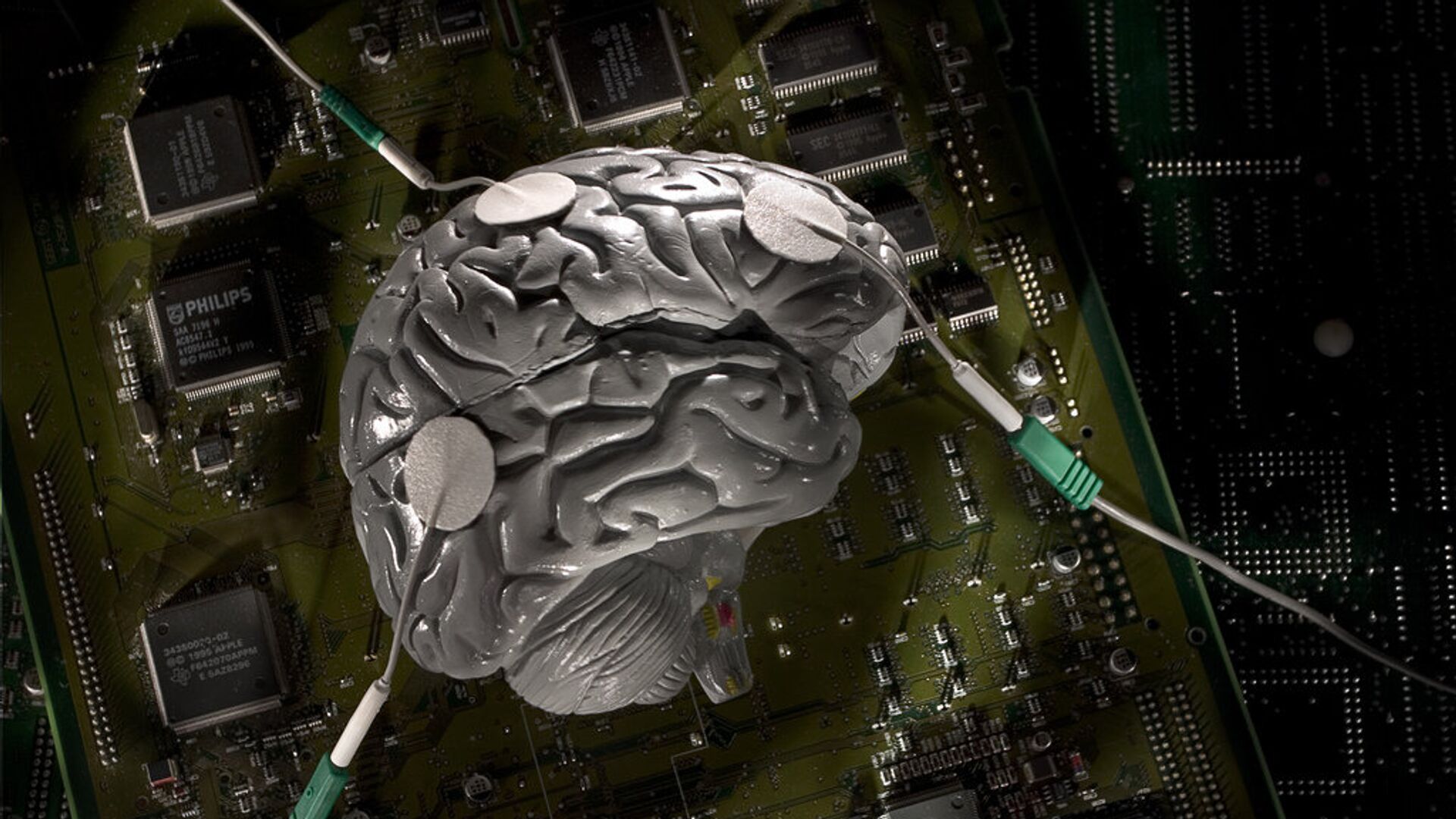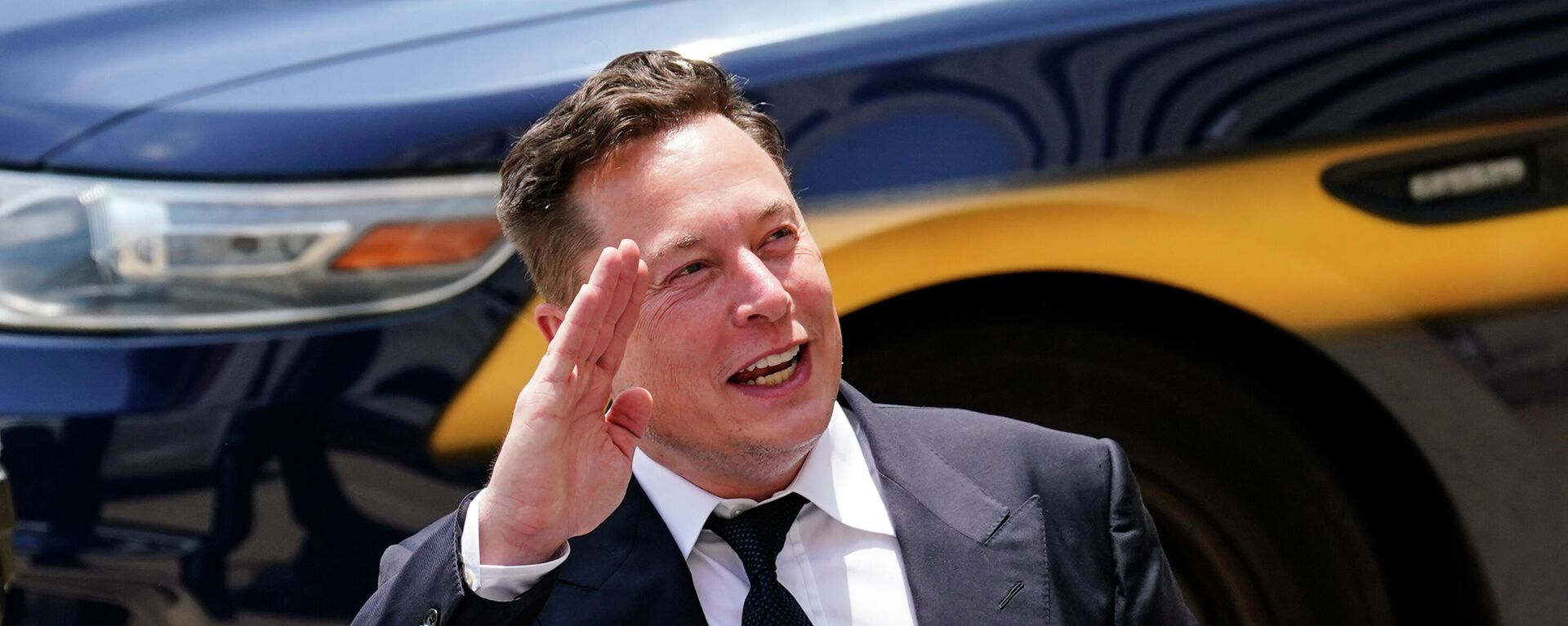https://sputnikglobe.com/20220408/elon-musk-other-billionaires-talk-merging-man-and-machine-1094603880.html
Elon Musk, Other Billionaires Talk Merging Man and Machine
Elon Musk, Other Billionaires Talk Merging Man and Machine
Sputnik International
Elon Musk and other billionaires are working on devices that could copy, or even alter our minds. They are called brain computer interfaces and they are coming... 08.04.2022, Sputnik International
2022-04-08T23:13+0000
2022-04-08T23:13+0000
2022-10-19T20:13+0000
gabe newell
brain-computer interface
meta
science & tech
singularity
ai
artificial brain
billionaires
elon musk
https://cdn1.img.sputnikglobe.com/img/103594/62/1035946229_0:1:1025:577_1920x0_80_0_0_9e44687d6d3b859fb45bc7bb1da0eb58.jpg
SpaceX Founder, Tesla CEO and newly appointed Twitter board member Elon Musk thinks that we will be able to download our brains into computers or robots in the not too distant future.The eccentric billionaire, who also owns Neuralink, a brain computer interface (BCI) company, told Business Insider that we could use a more advanced BCI to download our memories and personalities onto a computer chip, essentially creating a form of immortality.The goal for Neuralink is not to download us into robots, at least not in the short term. Its plan is to help people with brain and spinal injuries. But when asked if he thought it was possible, Musk did not disagree.It isn’t something that Musk is interested in doing himself; death is an essential part of a functioning society, he says.Musk points to the example of the US, calling its leadership “very, very ancient.”Still, he foresees a future where it is possible to download something resembling your consciousness into a robot, perhaps something not too unlike the “Tesla bot” named Optimus that he expects to come out next year.Musk is not the only billionaire throwing investment dollars at BCI. Meta* had 60 engineers working on a device that could potentially enable thought to text, but it was canceled last year before completion, partially because they hit a roadblock when trying to transition it from an implant to something that sits on the outside of your head.Gabe Newell, the owner of PC gaming storefront Valve, who has a net worth over $7 billion according to Bloomberg, has been working on a BCI project for gaming and Virtual Reality applications.Newell thinks BCIs could be more than devices that read our mind, they could write on them too, enabling fantastical experiences that exist only in our mind.“The real world will seem flat, colorless, blurry compared to the experiences you’ll be able to create in people’s brains,” Newell explained in a 2021 interview with a New Zealand news outlet.He even thinks that in these virtual worlds, you could have an entirely non-human body or use the BCIs to change your personality if you feel the need.“I'm feeling unmotivated today, I'll turn up my focus right now. My mood should be this.”If all that scares you, you are not alone. The Neurorights Foundation is an advocacy group working to promote regulations of neurotechnologies and argues for universal neurorights, ensuring that BCIs don’t infringe on mental privacy, personal identity or free will while giving fair access to neurotechnology to all. And Chile was the first country to adopt a Neurorights law in 2021.Futurist Ray Kurzweil predicted 2025 to be the year the singularity hits. That is, the moment when innovation progresses so rapidly through artificial intelligence, nanotechnology and robotics that machine learning will be infinitely more advanced than human intelligence, leading to the merging of human and machine, at which point we will spread out into the cosmos together.That seems unrealistic today; 2025 is just around the corner. But with eccentric billionaires like Musk, Newell and Zuckerberg, the future definitely seems weird, if nothing else.*Meta, Facebook are banned in Russia over extremist activities
https://sputnikglobe.com/20220327/elon-musk-believes-people-should-not-live-longer-says-us-has-very-ancient-leadership-1094244810.html
https://sputnikglobe.com/20220215/elon-musks-neuralink-admits-to-euthanizing-8-monkeys-during-experiments-with-brain-implanted-chips-1093038960.html
Sputnik International
feedback@sputniknews.com
+74956456601
MIA „Rosiya Segodnya“
2022
News
en_EN
Sputnik International
feedback@sputniknews.com
+74956456601
MIA „Rosiya Segodnya“
Sputnik International
feedback@sputniknews.com
+74956456601
MIA „Rosiya Segodnya“
gabe newell, brain-computer interface, meta, science & tech, singularity, ai, artificial brain, billionaires, elon musk
gabe newell, brain-computer interface, meta, science & tech, singularity, ai, artificial brain, billionaires, elon musk
Elon Musk, Other Billionaires Talk Merging Man and Machine
23:13 GMT 08.04.2022 (Updated: 20:13 GMT 19.10.2022) Elon Musk and other billionaires are working on devices that could copy, or even alter our minds. They are called brain computer interfaces and they are coming sooner than you might expect.
SpaceX Founder, Tesla CEO and newly appointed Twitter board member Elon Musk thinks that we will be able to download our brains into computers or robots in the not too distant future.
The eccentric billionaire, who also owns Neuralink, a brain computer interface (BCI) company, told
Business Insider that we could use a more advanced BCI to download our memories and personalities onto a computer chip, essentially creating a form of immortality.
The goal for Neuralink is not to download us into robots, at least not in the short term. Its plan is to help people with brain and spinal injuries. But when asked if he thought it was possible, Musk did not disagree.
“We could download the things that we believe make ourselves so unique. Now, of course, if you're not in that body anymore, that is definitely going to be a difference, but as far as preserving our memories, our personality, I think we could do that.”
It isn’t something that Musk is interested in doing himself; death is an essential part of a functioning society, he says.
Musk points to the example of the US, calling its leadership “very, very ancient.”
Still, he foresees a future where it is possible to download something resembling your consciousness into a robot, perhaps something not too unlike the “Tesla bot” named Optimus that he expects to come out next year.
Musk is not the only billionaire throwing investment dollars at BCI.
Meta* had 60 engineers working on a device that could potentially enable thought to text, but it was canceled last year before completion, partially because they hit a roadblock when trying to transition it from an implant to something that sits on the outside of your head.
Gabe Newell, the owner of PC gaming storefront Valve, who has a net worth over $7 billion according to
Bloomberg, has been working on a BCI project for gaming and Virtual Reality applications.
Newell thinks BCIs could be more than devices that read our mind, they could write on them too, enabling fantastical experiences that exist only in our mind.
“The real world will seem flat, colorless, blurry compared to the experiences you’ll be able to create in people’s brains,” Newell explained in a 2021 interview with a New Zealand news outlet. 
15 February 2022, 03:53 GMT
He even thinks that in these virtual worlds, you could have an entirely non-human body or use the BCIs to change your personality if you feel the need.
“I'm feeling unmotivated today, I'll turn up my focus right now. My mood should be this.”
Then, when talking about using BCIs to power synthetic hands, Newell imagined a different possibility. “As soon as you do that, you say, 'Oh, can you give people a tentacle?' Then you think, 'Oh, brains were never designed to have tentacles.' But it turns out, brains are really flexible.”
If all that scares you, you are not alone. The Neurorights Foundation is an advocacy group working to promote regulations of neurotechnologies and argues for universal neurorights, ensuring that BCIs don’t infringe on mental privacy, personal identity or free will while giving fair access to neurotechnology to all. And Chile was the first country to adopt a Neurorights law in 2021.
Futurist Ray Kurzweil predicted 2025 to be the year the singularity hits. That is, the moment when innovation progresses so rapidly through artificial intelligence, nanotechnology and robotics that machine learning will be infinitely more advanced than human intelligence, leading to the merging of human and machine, at which point we will spread out into the cosmos together.
That seems unrealistic today; 2025 is just around the corner. But with eccentric billionaires like Musk, Newell and Zuckerberg, the future definitely seems weird, if nothing else.
*Meta, Facebook are banned in Russia over extremist activities





